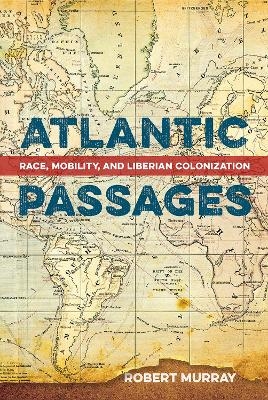
Atlantic Passages
Race, Mobility, and Liberian Colonization
Seiten
2021
University Press of Florida (Verlag)
978-0-8130-6675-2 (ISBN)
University Press of Florida (Verlag)
978-0-8130-6675-2 (ISBN)
Established in the early nineteenth century, Liberia is usually seen as an endpoint in the journeys of those who travelled there. Robert Murray reveals that many Liberian settlers did not remain in Africa but returned repeatedly to the US, and he explores the ways this movement shaped the construction of race in the Atlantic world.
Established by the American Colonization Society in the early nineteenth century as a settlement for free people of color, the West African colony of Liberia is usually seen as an endpoint in the journeys of those who traveled there. In Atlantic Passages, Robert Murray reveals that many Liberian settlers did not remain in Africa but returned repeatedly to the United States, and he explores the ways this movement shaped the construction of race in the Atlantic world.Tracing the transatlantic crossings of Americo-Liberians between 1820 and 1857, in addition to delving into their experiences on both sides of the ocean, Murray discusses how the African neighbors and inhabitants of Liberia recognized significant cultural differences in the newly arrived African Americans and racially categorized them as "whites." He examines the implications of being perceived as simultaneously white and black, arguing that these settlers acquired an exotic, foreign identity that escaped associations with primitivism and enabled them to claim previously inaccessible privileges and honors in America.
Highlighting examples of the ways in which blackness and whiteness have always been contested ideas, as well as how understandings of race can be shaped by geography and cartography, Murray offers many insights into what it meant to be black and white in the space between Africa and America.
Established by the American Colonization Society in the early nineteenth century as a settlement for free people of color, the West African colony of Liberia is usually seen as an endpoint in the journeys of those who traveled there. In Atlantic Passages, Robert Murray reveals that many Liberian settlers did not remain in Africa but returned repeatedly to the United States, and he explores the ways this movement shaped the construction of race in the Atlantic world.Tracing the transatlantic crossings of Americo-Liberians between 1820 and 1857, in addition to delving into their experiences on both sides of the ocean, Murray discusses how the African neighbors and inhabitants of Liberia recognized significant cultural differences in the newly arrived African Americans and racially categorized them as "whites." He examines the implications of being perceived as simultaneously white and black, arguing that these settlers acquired an exotic, foreign identity that escaped associations with primitivism and enabled them to claim previously inaccessible privileges and honors in America.
Highlighting examples of the ways in which blackness and whiteness have always been contested ideas, as well as how understandings of race can be shaped by geography and cartography, Murray offers many insights into what it meant to be black and white in the space between Africa and America.
Robert Murray is assistant professor of history and chair of the Humanities Department at Mercy College in Dobbs Ferry, New York.
| Erscheinungsdatum | 16.01.2021 |
|---|---|
| Zusatzinfo | 4 black & white illustrations |
| Verlagsort | Florida |
| Sprache | englisch |
| Maße | 152 x 229 mm |
| Gewicht | 580 g |
| Themenwelt | Geisteswissenschaften ► Geschichte ► Regional- / Ländergeschichte |
| Sozialwissenschaften ► Ethnologie | |
| Sozialwissenschaften ► Soziologie | |
| ISBN-10 | 0-8130-6675-1 / 0813066751 |
| ISBN-13 | 978-0-8130-6675-2 / 9780813066752 |
| Zustand | Neuware |
| Haben Sie eine Frage zum Produkt? |
Mehr entdecken
aus dem Bereich
aus dem Bereich


